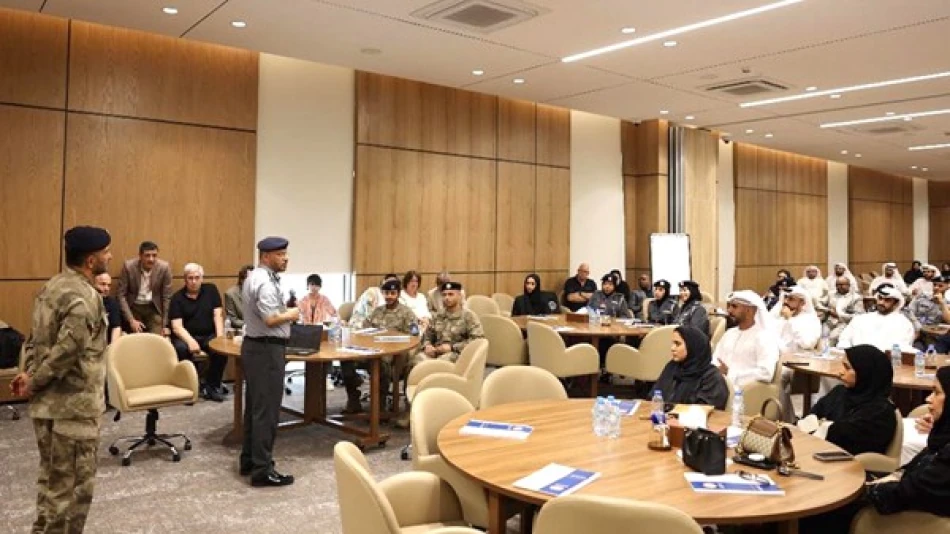
شرطة أبوظبي تنفّذ دورات تخصصية في تحديد هوية ضحايا الكوارث
Abu Dhabi Police Elevates Disaster Response Capabilities Through Advanced European Training Partnership
Abu Dhabi Police has completed a comprehensive series of specialized training programs in disaster victim identification (DVI), partnering with the European Training Academy Foundation to enhance emergency response capabilities. The initiative reflects the UAE's growing emphasis on building world-class crisis management infrastructure as the nation positions itself as a regional hub for safety and security excellence.
Comprehensive Training Framework Addresses Critical Response Gaps
The Crisis and Disaster Management Department of Abu Dhabi Police executed four specialized courses covering crime scene investigation (CSI-DVI), information gathering, pre-mortem disaster victim identification, and legal aspects of disaster response. These programs involved officers and specialists from emergency response and field operations units, creating a multi-disciplinary approach to disaster management.
Brigadier Mohammed Dahi Al Hamiri, Director of Central Operations at Abu Dhabi Police, emphasized that the training aligns with international standards, particularly Interpol's disaster victim identification protocols. This standardization proves crucial for cross-border cooperation during major incidents, where multiple jurisdictions often collaborate.
International Standards Drive Local Capabilities
The partnership with the European Training Academy Foundation (ETAF) represents a strategic investment in human capital development. By adopting European best practices, Abu Dhabi Police positions itself to handle complex disaster scenarios that require sophisticated forensic capabilities and victim identification procedures.
The training covered specialized tasks including evidence collection and documentation by CSI teams, family liaison officer (FLO) coordination with victim families, and practical applications of identity verification protocols. These skills become essential during mass casualty events, where accurate victim identification directly impacts family closure and legal proceedings.
Regional Leadership in Emergency Preparedness
Brigadier Ahmed Nasser Al Kindi, Director of Crisis and Disaster Management and head of the disaster victim identification team, highlighted how this initiative supports Abu Dhabi Police's strategic direction in humanitarian operations. The emphasis on international partnerships reflects the UAE's broader diplomatic approach of building technical cooperation agreements that enhance domestic capabilities.
Comparative Context: Global Disaster Response Evolution
This training initiative mirrors similar capacity-building efforts across developed nations following major disasters. Countries like Singapore and Switzerland have invested heavily in disaster victim identification capabilities after recognizing gaps exposed during international crises. The UAE's proactive approach suggests learning from these experiences rather than waiting for a triggering event.
The focus on legal aspects of disaster victim identification proves particularly relevant given Dubai and Abu Dhabi's roles as international business hubs. Foreign nationals comprise significant portions of the population, meaning disaster response must accommodate complex jurisdictional and diplomatic considerations.
Operational Impact and Future Implications
The graduation ceremony, conducted by Brigadier Dr. Rashid Mohammed Borshed Al Nuqbi, Deputy Director of Saif bin Zayed Academy for Police and Security Sciences, underscored institutional commitment to sustained capability development. The academy's involvement indicates these programs will likely expand and become integrated into standard training curricula.
The training's emphasis on information sharing between local and international partners addresses a critical challenge in modern disaster response. As climate change increases extreme weather frequency and urbanization creates more complex emergency scenarios, seamless coordination between agencies becomes essential for effective response.
Investment in Humanitarian Excellence
This initiative represents more than technical training—it signals Abu Dhabi's commitment to humanitarian excellence as a component of soft power projection. By developing world-class disaster response capabilities, the emirate enhances its reputation as a reliable partner for international cooperation and crisis management.
The program's success will likely encourage similar investments across other UAE emirates and potentially influence regional approaches to disaster preparedness. As the UAE continues diversifying its economy and expanding international partnerships, robust crisis management capabilities become increasingly valuable for maintaining investor confidence and operational continuity.
Most Viewed News

 Layla Al Mansoori
Layla Al Mansoori






